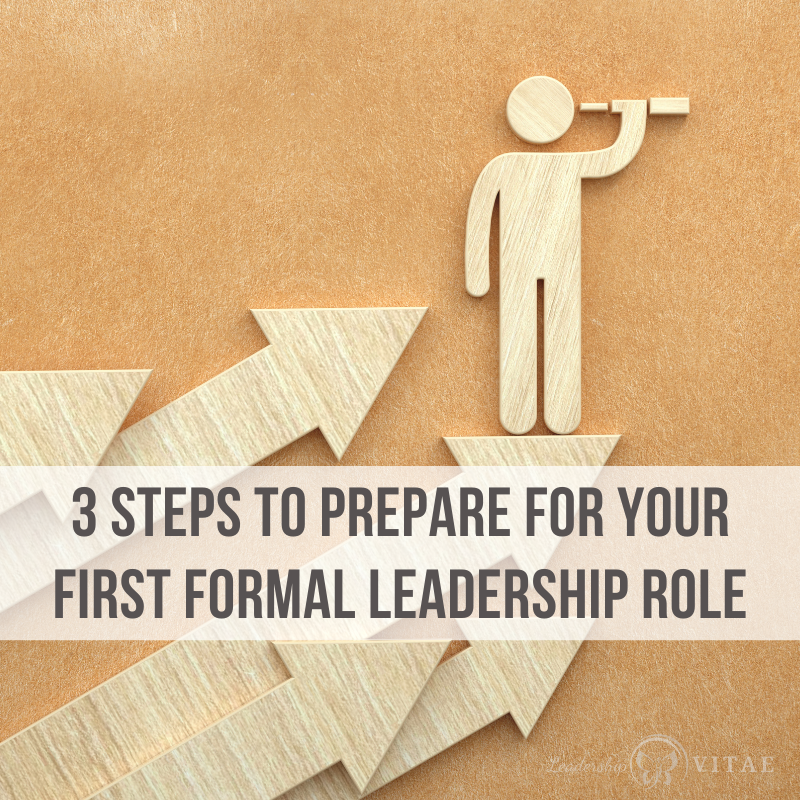
That first leadership role can be a tough one to get. The catch-22 of needing experience to get a role, but theoretically only getting that experience if someone gives you a chance. So how can we build that experience ahead of becoming a formal leader? By building our leadership brand.
To me, leadership is a verb. It’s something we choose to practice every day in how we live, engage others, and show up in the world. Every day is filled with moments to demonstrate (good or poor) leadership. The key to building a good leadership brand is intention.
We can all do amazing things by accident. Consistency takes intention and practice. To build our leadership brand there are three steps to intention and practice that we’ll reflect on further.
- Be clear on your personal leadership
- Live it like you mean it
- Lean into leadership opportunities
1. Be clear on your personal leadership
The first step is preparing well in advance for a guaranteed interview question: “what is your leadership style?” It may be some variation on that question, but interviewers want to know how you’d lead. If you’re an informal leader and considering formal leadership, it’s time to ask yourself this question.
This is the “why you” question and you should start there. Why should you be a leader?
To best answer this question, decide on the leadership principles you bring (or aspire to bring) to life every day.
To do that, consider the most impactful moments in your career:
- Leaders you’ve admired and helped you.
- Managers that made you feel like crap.
- Moments where you felt most like someone worth following.
- A-ha moments you learned from.
Choose the top 3-5 moments or stories. For each one, select a word that captures an intention you want to bring to life. Those are your leadership principles.
We have a few words…now what?
2. Live them like you mean them
There’s a relationship theory that says to attract what you want in a mate, live those qualities yourself. The same holds true for leadership.
You want to be chosen to lead others? Then live the qualities of leadership that will get you there. In every moment, every interaction.
Consider each of the leadership principles you aspire to. What do they look like in practice? What are everyday moments where you might not yet demonstrate them the way you’d like?
I went through this exercise the first time years ago as I was laid up following surgery. With lots of time on my hands, I went deep on my leadership so I could better reflect on how I was showing up and whether it aligned with my intentions.
Leadership VITAE was born from this exercise. My five principles are Vulnerability, Integrity, Transparency, Accessibility, and Empathy. They are tangible and real goals I can hold myself to. Reflect regularly to determine whether I am engaging in a way that reflects what I purport to believe in.
3. Lean into leadership opportunities
Words matter. We know when someone is being authentic vs saying the right thing. In fact, we don’t need to say the words (except in the interview). Instead, we embody them. We can aspire to our leadership principles, but we don’t get to claim them. Others let us know the kind of leader we truly are.
That’s why this last step is so important. We tend to hire those we trust and we trust who we know. If we have not yet been a formal leader, there isn’t anyone that can vouch for us in that capacity.
However, we can lean into informal leadership opportunities and demonstrate our principles. In an ideal scenario, a hiring manager asks around and those that have engaged with us share our principles. They say we are transparent or have high empathy. We want team members, peers, partners, and stakeholders to reflect back to others the principles we aspire to.
Here are five ways to build your leadership experience and brand.
Raise your hand
If you see something can be improved in how you work, do it. Then look around and see how it might help others. Maybe you’re stuck and not sure how to move forward. Don’t be afraid to ask for help. See if anyone else has experienced it and then feel compelled to get the word out to make things better for the team, sharing credit with the person who helped you.
Be a mentor/coach
Share what you know. The ability to provide feedback and develop others is a foundational skill to being a formal leader. One that is frequently overlooked in leader development but is expected of all leaders and extremely critical to success in the role. Everyone has something to share, no matter how junior they may be. Reverse mentoring can be as valuable as mentoring, so don’t let tenure or experience hold you back.
Lead a small effort
Most companies have a myriad of change efforts going on at any given time. Volunteer to lead one that aligns to your interests or skills. For example, it could be creating a new Employee Resource Group, implementing feedback from a recent Employee Opinion Survey, or introducing a process improvement. If you’re not comfortable leading the whole thing, volunteer to be part of the team and find ways to take point on certain activities or lead a sub-group.
Backfill as an interim
Leaders are human too and sometimes life happens. If a leader goes out on an extended vacation or a leave of absence, often someone needs to step into the gap. If you’ve done some of the items above, you’d likely stand out as someone who could backfill. This is a perfect opportunity to gain experience “in the seat” in preparation for a formal role change.
Take informal leadership roles
Project, program, and product managers are rarely direct HR leaders but are responsible for leading change. Change is the only constant in life and business, so change management is a great skill to develop regardless of role. It’s a great opportunity to demonstrate stakeholder management skills, getting work done through others, and working across teams or business units.
Take the leap
Informal leadership experience gives us the chance to hone our skills and refine our leadership principles. Periodic reflection is a great way to determine if we’re leading with intention and where we might want to adjust.
It’s also a fantastic way to build our brand, as we end up working with others who can speak to our leadership. When a hiring manager asks around, ideally, they’ll hear we have the kind of leadership style they are looking for on the team.
With clarity of your principles and brand ambassadors able to vouch for them, it’s time to take the leap. You’ll have at least one interview question nailed and experiences to pull from for the inevitable behavioral questions that follow. When you hear about an opportunity, go for it!
If you put this article’s advice into practice, please come back and share with us in the comments. For experienced leaders, what else would you recommend when preparing for that first formal leadership role? Please share your thoughts to help others on their journey.








